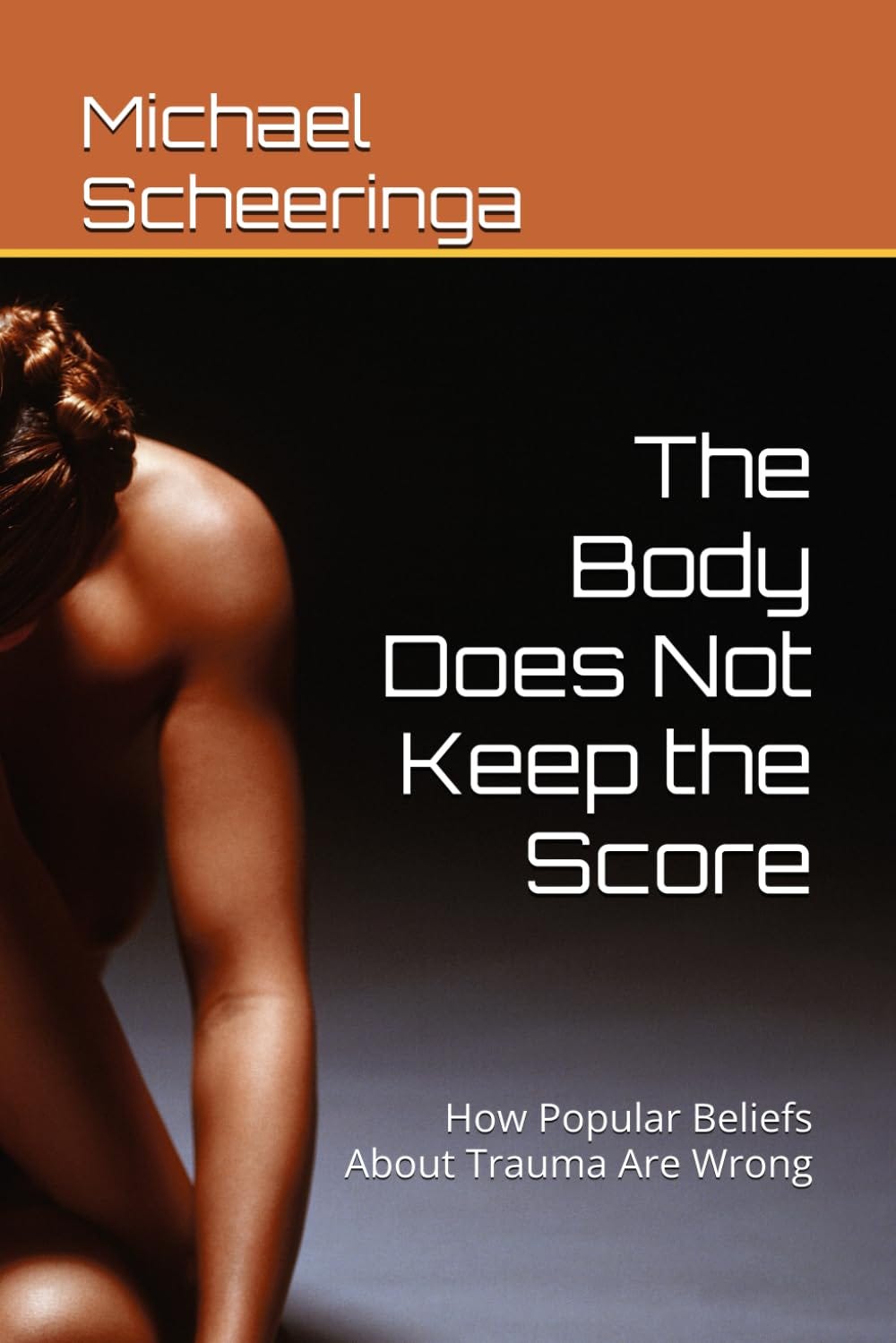You Can Do Hard Things
Resiliency in Life
Welcome to Polymathic Being, a place to explore counterintuitive insights across multiple domains. These essays explore common topics from different perspectives and disciplines to uncover unique insights and solutions.
Today's topic challenges everyone to reclaim who you are meant to be by embracing the challenge of doing hard things. Along the way, we’ll uncover the dangers of pop psychology that permeate the popular book “The Body Keeps the Score” and show how sadly limiting those ideas are. As we conclude, you’ll see just how powerful and resilient you can be when you internalize action and agency to grow.
🎧Prefer to listen? You can find these essays on all major podcast players!
Intro
“You can do hard things.” This was a phrase my wife started using with our kids when they’d complain about a challenge. If you have kids, you’ll know that there’s an unending list of complaints because, as they mature, each new step, each new milestone, increases the expectations of their performance. For anyone else, you’ll recognize that this adventure never stops. Every day, as we grow, we stretch, and our performance improves, allowing us to stretch again. At least, that’s how it should be.
The problem is that, all too often, we give up. Worse, parents allow their kids to give up. Even worse, parents will remove obstacles from their kids’ lives in an attempt to protect them from challenges. But that’s not how humans work.
Remember the Movie “The Matrix” and how Agent Smith described it?
Did you know that the first Matrix was designed to be a perfect human world? Where none suffered, where everyone would be happy. It was a disaster. No one would accept the program. Entire crops were lost. Some believed we lacked the programming language to describe your perfect world. But I believe that, as a species, human beings define their reality through suffering and misery. The perfect world was a dream that your primitive cerebrum kept trying to wake up from. Which is why the Matrix was redesigned to this: the peak of your civilization.
The Problem of Pop-Psychology
Nothing exemplifies our failure to internalize these challenges and grow as well as the mega-popular book The Body Keeps the Score by Bessel van der Kolk. I read it a couple of years ago, and I thought it was fascinating. It certainly felt like trauma should have a physical manifestation beyond just the effects of stress. However, I quickly started to dislike how so many people who read that book took the opportunity to externalize any minor malady as trauma-induced.
That’s because our bodies and brains aren’t as fragile as that book indicates. The counterintuitive fact is that we are very antifragile and need trauma to grow, just like we uncovered in Trauma and Antifragility. When we ignore this truth, we actually make ourselves weaker and more susceptible to the very trauma we blame.
The Body Keeps the Score is popular because it enables us to externalize our issues onto someone else. This is a bad proposition in general, but it's made worse because the book’s primary arguments represent the worst examples of bad science, and the same goes for most of the recommendations. Simply put, it’s a fraud.
The book started as a paper in the mid-90s, which was rebutted rigorously then. When it was published, the scientific community viewed it as a flash in the pan of pop psychology and didn’t react. The problem is that it provides a smooth narrative, fun stories, and copious footnotes no one reads, which allows us to blame others.
Child trauma psychologist Michael S Scheeringa realized belatedly that the book wasn’t going away and penned a crippling rebuttal, “The Body Does Not Keep the Score: How Popular Beliefs About Trauma Are Wrong.” His refutation highlights that the copious footnotes in Bessel van der Kolk’s book had egregious errors where studies didn’t address the topic, references ignored contrary studies, the author misrepresented his own studies, citations were just not provided at all, and a litany of other critical concerns.
Van der Kolk’s ‘fast and loose’ technique allowed statements to be added that hid the gap of credible science. At its core, it’s the worst of pop psychology, and the negative effects have been terrible with an explosion of trauma-informed care, childhood memories “uncovered” using the same fraudulent methods from the satanic panic of the 1980s, and families ripped apart as children grasp at any excuse to externalize their struggles by blaming others.
It would be bad enough if van der Kolk were an outlier, but there’s an entire industry pushing these bad ideas, where everything is pathologized to push therapy, pharmaceuticals, and more, as books Saving Normal and Bad Therapy go into great detail, uncovering. Even personality is pathologized, diagnosed, and drugged as Freya India recently shared in Nobody Has A Personality Anymore. The consequences are dire, with 72% of Gen Z girls saying “mental health challenges are an important part of my identity.” Not only are we diagnosing everything as trauma, we’re making it a core part of our identity. No wonder we have a mental health crisis!
Thankfully, as the ideas behind The Body Keeps the Score crumble under scrutiny, we can return to the opportunity to understand that we are resilient and we can do hard things. Even better, we become stronger, healthier, more mentally stable, and more energized as we tackle harder challenges when we discard the excuses as Karina Schneidman MBA, MS identifies below:
You Can Do Hard Things
Back to my kids doing hard things; When they turn ten, they’re required to work out with us. We start them with the same exercises that my wife and I do, focusing on form. As they master the basics, we push them to continue increasing the weight, reps, intensity, and more. They quickly realize that the increased effort physically hurts as muscle fibers are torn.
“That’s a feature, not a bug,” I remind them as I explain that to build muscle, you have to break muscle. Recently, they joined a youth mountain biking team and have been putting in miles on challenging Tucson trails in 100+ degree heat. They’re loving every minute, and they’re surrounded by others who are doing the same hard thing.
We also apply this technique to their emotional regulation. Life isn’t fair, people aren’t nice, nature is always trying to kill you, and we are always facing a pending apocalypse. Or, to quote The Dread Pirate Roberts: “Life is pain, highness. Anyone who says differently is selling something.” Contrary to van der Kolk's best-selling book, which advocates for externalizing one's agency and embracing pain, we teach our children to internalize their agency, acknowledge the inherent chaos and trauma of life, and to view each experience as a valuable lesson to grow from.
Just as our bodies adapt to achieve muscle growth, immune system resilience, and improved cardio health, our brains are also adaptable, allowing trauma to be incorporated into learning. We teach our kids that mistakes aren’t failures unless you don’t learn from them. The lesson I hope you learn today is that you can do hard things, and sometimes that means picking yourself up time and time again. To reiterate, our brains and bodies are naturally antifragile, and stressors are required to grow stronger. We don’t let our kids be broken by trauma; we teach them how to grow stronger.1
In the mantra of “hard times make strong men, strong men make good times, good times make weak men, and weak men create bad times,” nothing is stopping us from challenging ourselves regardless of where we fall on that continuum. Our own self-challenge does a tremendous amount to strengthen ourselves and to help strengthen those around us. As Kyle Shepard, who writes Resilient Mental State, which I highly recommend, recently posted:
That’s one of the goals of Polymathic Being: I challenge myself each week to find the counterintuitive insights so we can push back on the entropy that surrounds us constantly. It takes energy, but that energy invigorates your agency, and that agency allows you to stand tall in the chaos instead of wallowing in misery. You can do hard things, and you’ll be better because of it. It’s time to break out of the Matrix of pop-psychology and reclaim who you are meant to be.
Did you enjoy this post? If so, please hit the ❤️ button above or below. This will help more people discover Substacks like this one, which is great. Also, please share here or in your network to help us grow.
Polymathic Being is a reader-supported publication. Becoming a paid member keeps these essays open for everyone. Hurry and grab 20% off an annual subscription. That’s $24 a year or $2 a month. It’s just 50¢ an essay and makes a big difference.
Further Reading from Authors I Appreciate
I highly recommend the following Substacks for their great content and complementary explorations of topics that Polymathic Being shares.
Goatfury Writes All-around great daily essays
Never Stop Learning Insightful Life Tips and Tricks
Resilient Mental State Toughen your body and your mind
Educating AI Integrating AI into education
Socratic State of Mind Powerful insights into the philosophy of agency
If you really want a shocking juxtaposition for life, compare yourself to the Mae Enga of the western highlands of New Guinea who Sam Alaimo writes about in How Warrior Cultures Teach Us to Face Suffering Without Blame.









Michael, Awesome article!! I’ve had some age related physical and financial challenges in the past couple of years. As a result, at times I’ve started thinking like a “snow flake” about some difficulties. You know, “Don’t start anything - you won’t be able to finish it anyway”, “Quit thinking like a teenager - your a feeble old man”, and my favorite, “That’s gonna’ hurt - so don’t even go there”. The youthful exuberance (still there in the background) and the young Marine Corps Sergeant (still alive and well), that have fed my energy at every turn (for my whole life), eventually crowd their way back to the front of the cluster; telling the weak me’s to lead, follow or get out of the way. So, I still go places despite that part of me saying “you can’t handle that”! A wise person will discover that an old person can do things if they put their mind to it. I can use some tech to do what my body used to do. Where my body may fail, my mind may succeed. There’s more than one way to do almost everything. Slow and steady may still win the race (remember “The tortoise and the hare”). Thanks, Michael, for reminding me of my strengths, rather than my weaknesses. You young folks; I suggest you learn where your limits are (they’re a lot farther out than you think), don’t be afraid of hard work, in fact pursue it! Have courage to be the first one to volunteer for a difficult task, learn by doing, share what you learn.
Michael, thank you so much for the mention. You already know what I think of the book and the idea that our bodies “keep” score, like it’s some intuitive list—which obviously isn’t true. What I find more interesting is the fact that so little time and research are spent on expanding how powerful the brain is, and how undeniable healing is when it is the only narrative.
If you tell a patient that they’ll heal, they’re more likely to heal. If they’re told that their body will never forget, their brain will likely remind them. It’s profound. Resilience doesn’t pay as much as trauma, that’s the fact.